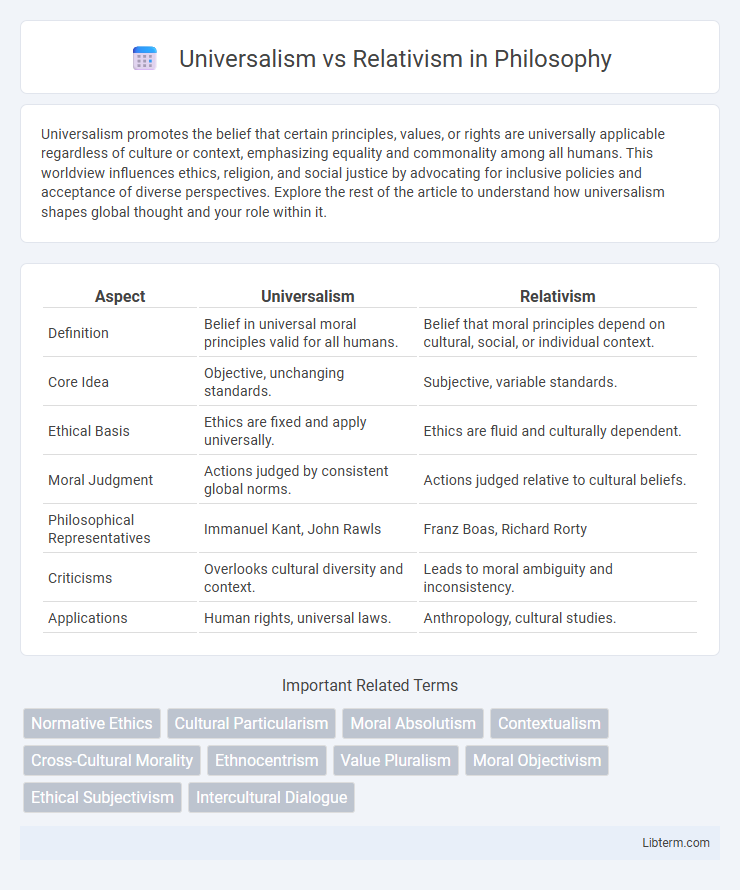Universalism promotes the belief that certain principles, values, or rights are universally applicable regardless of culture or context, emphasizing equality and commonality among all humans. This worldview influences ethics, religion, and social justice by advocating for inclusive policies and acceptance of diverse perspectives. Explore the rest of the article to understand how universalism shapes global thought and your role within it.
Table of Comparison
| Aspect | Universalism | Relativism |
|---|---|---|
| Definition | Belief in universal moral principles valid for all humans. | Belief that moral principles depend on cultural, social, or individual context. |
| Core Idea | Objective, unchanging standards. | Subjective, variable standards. |
| Ethical Basis | Ethics are fixed and apply universally. | Ethics are fluid and culturally dependent. |
| Moral Judgment | Actions judged by consistent global norms. | Actions judged relative to cultural beliefs. |
| Philosophical Representatives | Immanuel Kant, John Rawls | Franz Boas, Richard Rorty |
| Criticisms | Overlooks cultural diversity and context. | Leads to moral ambiguity and inconsistency. |
| Applications | Human rights, universal laws. | Anthropology, cultural studies. |
Introduction to Universalism and Relativism
Universalism asserts that certain ethical principles or values apply universally to all humans regardless of culture, emphasizing objective moral standards. Relativism argues that moral judgments and ethical norms are culturally dependent and vary across societies, rejecting absolute truths. Understanding these opposing frameworks is essential for analyzing cross-cultural ethics and global moral debates.
Defining Universalism: Core Principles
Universalism asserts that certain moral principles or values are universally valid and applicable across all cultures and contexts, emphasizing objective standards of right and wrong. Core principles include human rights, justice, and equality, which are considered inalienable regardless of cultural differences. This perspective prioritizes common ethical norms that transcend individual societies to promote global consistency and fairness.
Understanding Relativism: Key Concepts
Relativism posits that truth and moral values are not absolute but vary across cultures, societies, and historical contexts, emphasizing the importance of perspective in ethical judgments. Key concepts include cultural relativism, which asserts that beliefs and practices should be evaluated based on the cultural context in which they arise, and moral relativism, which denies universal moral standards, highlighting the diversity of moral frameworks worldwide. Understanding relativism requires recognizing the influence of social, linguistic, and historical factors on knowledge and truth, challenging the idea of objective or fixed principles.
Historical Contexts and Philosophical Origins
Universalism traces its origins to Enlightenment thinkers like Immanuel Kant, who emphasized inherent human rights and moral principles applicable across cultures and time. Relativism, rooted in ancient Greek skepticism and later developed by philosophers such as Friedrich Nietzsche, challenges the notion of absolute truths, asserting that moral and cultural values are context-dependent and historically situated. Throughout history, these philosophical positions have influenced debates on ethics, law, and human rights, reflecting shifting perspectives on cultural diversity and moral authority.
Universalism in Human Rights and Ethics
Universalism in human rights asserts that certain rights and ethical principles apply to all individuals regardless of culture, nationality, or context, emphasizing universality and inherent dignity. This perspective is rooted in international frameworks such as the Universal Declaration of Human Rights, which establishes global standards based on shared moral values. Universalism supports legal protections and ethical norms that transcend cultural differences, promoting equality and justice worldwide.
Relativist Approaches in Cultural Studies
Relativist approaches in cultural studies emphasize the contextual understanding of values, norms, and practices within specific cultures, rejecting universal standards imposed from external perspectives. These approaches advocate for cultural specificity, highlighting how meaning and morality are shaped by unique historical, social, and environmental factors. Relativism challenges ethnocentric biases by promoting interpretative frameworks that respect cultural diversity and internal coherence.
Key Debates: Tension and Intersection
Universalism asserts that certain ethical principles and human rights are globally applicable, emphasizing shared norms and standards, while relativism argues that moral values and cultural practices are context-dependent, shaped by societies' unique histories and environments. Key debates focus on the tension between preserving universal human rights and respecting cultural diversity, with critics highlighting risks of cultural imperialism and advocates stressing the necessity of common frameworks for justice and equality. The intersection occurs in efforts to balance global ethical standards with local customs, fostering dialogue that accommodates pluralism without compromising fundamental human dignity.
Case Studies: Practical Implications
Universalism in ethics emphasizes applying consistent moral principles across all cultures, evidenced by case studies in international human rights where standard norms guide judgments on practices such as torture and freedom of expression. Relativism highlights cultural context in ethical decision-making, as seen in healthcare scenarios where patient autonomy and truth-telling vary significantly between Western and non-Western societies. Practical implications of these perspectives inform policymaking, requiring balance between respecting cultural diversity and upholding global ethical standards in multinational governance and corporate social responsibility.
Criticisms and Limitations of Both Perspectives
Universalism faces criticism for imposing a fixed set of moral standards that may ignore cultural diversity and contextual nuances, leading to ethnocentric biases. Relativism is limited by its potential to justify harmful practices under the guise of cultural differences, undermining the possibility of universal human rights and ethical accountability. Both perspectives struggle with balancing respect for cultural diversity and establishing consistent moral guidelines applicable across different societies.
Towards a Balanced Framework: Synthesis and Future Directions
The synthesis of Universalism and Relativism advocates for a balanced framework that respects cultural diversity while upholding fundamental human rights, integrating ethical pluralism with global norms. Emerging research emphasizes adaptive governance models allowing context-sensitive applications of universal principles, fostering mutual understanding and cooperation across cultures. Future directions highlight interdisciplinary approaches combining philosophy, anthropology, and international law to develop dynamic, inclusive policies promoting equity and justice worldwide.
Universalism Infographic

 libterm.com
libterm.com